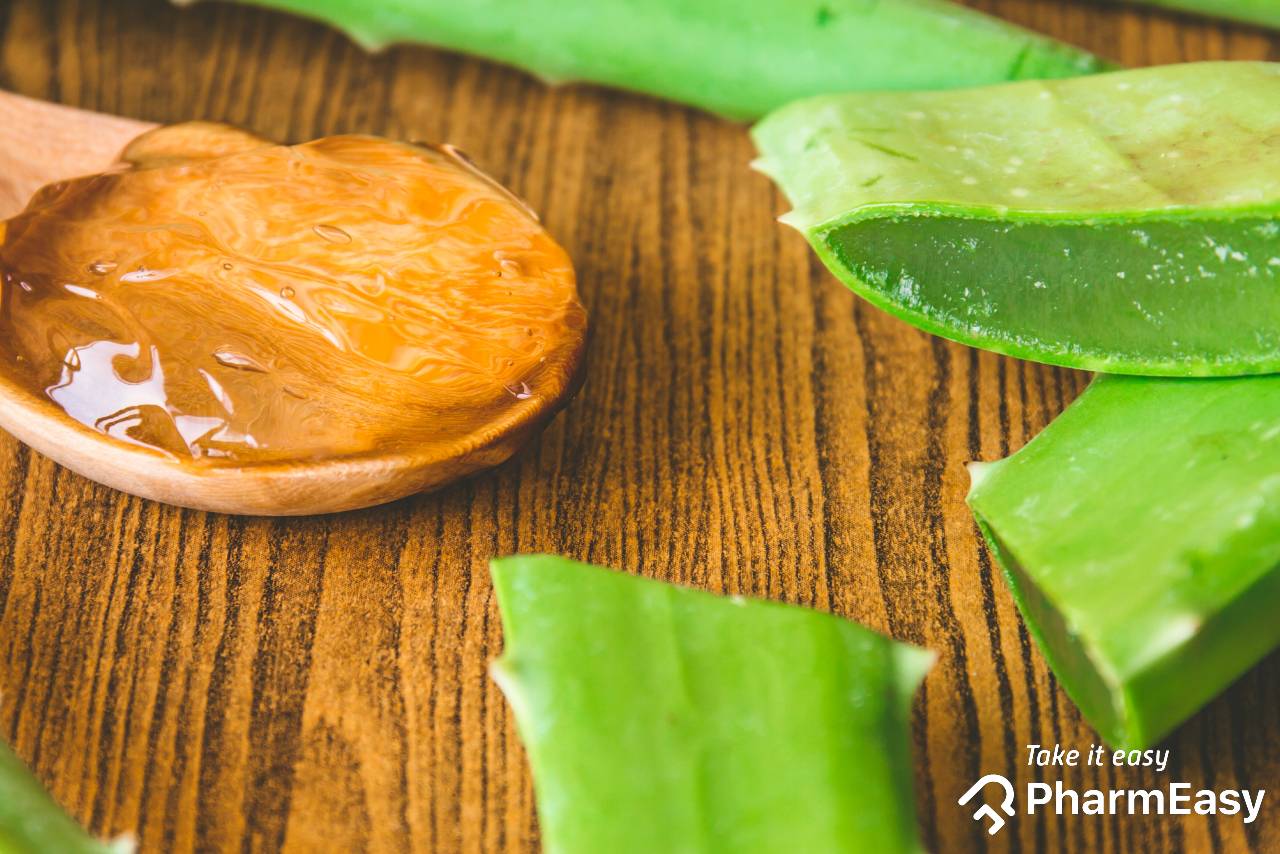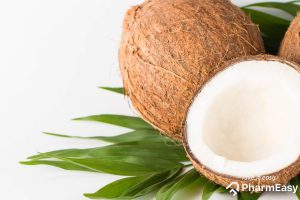Table of Contents
Introduction:
The botanical name of aloe vera is Aloe barbadensis miller, and it belongs to the family Liliaceae. The term aloe vera is derived from the Arabic word ‘alloeh’, which means ‘shining bitter substance’, and vera (Latin) means ‘true’. For centuries, aloe vera has been used for its medicinal, health, beauty, and skincare effects. It has been used for several reasons in dermatology. It mainly grows in the dry regions of Asia, America, Africa, and Europe. In India, it is found in Maharashtra, Gujarat, Rajasthan, Tamil Nadu, and Andhra Pradesh.1 Aloe vera is also called wand of heaven, potted physician, wonder plant, plant of life, and heaven’s blessing.2 The other famous names of aloe vera are Indian Alces, Aloe, Ghirita, Kumari, Gawarpaltra, Lu hui, Curacao aloe, and Barbados aloe.3
Nutritional Value of Aloe Vera:
Aloe vera contains vitamins A, B12, C and E, choline, folic acid, minerals (sodium, calcium, manganese, magnesium, copper, zinc, potassium, chromium, and iron), sugars, amino acids, and sterols.2

Therapeutic Uses of Aloe Vera:
For many centuries, aloe vera has been used for its curative and therapeutic properties. Also, it is used as a traditional remedy for several conditions and is found in some food products and dietary supplements. It is found in several skin products that include sunblocks and lotions. It is used in the pharmaceutical industry to manufacture topical products like gel preparations and ointments and produce capsules and tablets. Aloe vera has several therapeutic uses due to its laxative, painkilling, anti-fungal, anti-bacterial, anti-viral, anti-oxidant, antiseptic, and anti-inflammatory properties.4
Also Read: Castor Oil – Uses, Benefits, Precautions & More!
Benefits of Aloe Vera:
1. Benefits of Aloe Vera for Skin:
· Benefits of aloe vera for wounds:
Aloe vera is known for its healing and soothing effects on burns and other wounds. On application to a wound, aloe vera increases the wound closure rate and the tensile strength.4
· Benefits of Aloe Vera for Anti-Ageing Effects:
Aloe vera’s components can reverse degenerative skin changes. This could reverse the ageing effects of the skin.3 Aloe vera is an amazing moisturiser and gives moisture to the skin. It makes the skin more elastic and less wrinkled. It softens the skin and tightens the pores.
Read More: 8 Best Anti-Aging Foods to Look Younger
· Other benefits of aloe vera for skin:
It also protects the skin from dust and other natural elements that can cause harm to the skin.4
2. Benefits of Aloe Vera for Diabetes:
Aloe vera is used in many parts of the world as a traditional remedy for diabetes mellitus. Studies in animals and humans suggest that aloe vera can improve chronic hyperglycaemia (an excess of glucose in the blood) and disturbed lipid profile, which are the features of diabetes mellitus and are major risk factors for heart-related diseases. It was also found to reduce the blood sugar levels in diabetes patients. It might be helpful for preventing gestational diabetes (a type of diabetes that develops during pregnancy in women).4
3. Benefits of Aloe Vera for Antimicrobial Activity:
The aloe vera extract was found to be effective against bacteria including Mycobacterium tuberculosis, E. coli, Pseudomonas aeruginosa, Salmonella typhi, Staphylococcus aureus, Streptococcus faecalis, and Streptococcus pyogenes. It was found to be effective in killing viruses. Aloe vera gel fractions reduced the proliferation of cells of cytomegalovirus. It is effective against herpes simplex virus, pseudorabies virus, and influenza virus. It reduced the growth of fungi Malassezia furfur and Candida albicans. It also reduced the growth of some microbes that cause foodborne diseases in humans or animals.4
4. Benefits of Aloe Vera for Ulcers:
Aloe vera juice is valuable for managing ulcers, heartburn, and other digestion-related diseases. The extract of aloe vera can prevent acid secretion. Some studies have identified that aloe vera may also be used for children.4
5. Benefits of Aloe Vera for Inflammation:
Some of the features of inflammation include pain, swelling, redness, and heat, which delays the healing process. The gel of aloe vera not only relieves discomfort and pain but also speeds up the healing process. It reduces inflammation pain and acts as a natural pain killer.4
6. Benefits of Aloe Vera for Tumour:
Aloe vera gel has anti-tumour and anti-ulcer effects and increases the multiplying of normal human dermal (skin) cells. The aloe vera extract was evaluated for cancer prevention activity in an animal model. It prevented the tumour-promoting effects of Phorbol myristic acetate, suggesting that aloe gel might be beneficial in preventing cancer.4
7. Benefits of Aloe Vera for Detox:
The juice of aloe vera is an excellent natural aid for detox. Due to our unhealthy food intake, the pollution around us, and our stressful lives, our body systems require regular cleansing. Aloe vera juice gives minerals, vitamins, and trace elements to help and support our body to deal with our daily stresses.4
Read More: How to Detox Your Body?
How to Use Aloe Vera?
Aloe vera can be used in the following ways:
- Gel
- Lotion
- Cream
- Juice4
Your Ayurvedic physician will prescribe you the form as per your requirement.
Side Effects of Aloe Vera:
The side effects of oral use include diarrhoea, abdominal cramps, hepatitis, red urine, irregular heartbeat, and worsening of constipation. Its laxative effects may cause electrolyte imbalances. It has been reported that prolonged use of aloe vera may increase the risk of colorectal cancer.1,3 The side effects observed with topical use include burning, redness, stinging sensation, and rarely generalised dermatitis (skin inflammation) in sensitive people. It is advised to apply aloe vera to a small area first to test for any possible allergic reaction.1
Also Read: 8 Best Home Remedies For Immediate Relief From Constipation
Precautions to Take With Aloe Vera:
Do not consume aloe vera if you have heart diseases, diabetes, kidney problems, are nursing, pregnant, allergic to garlic, onions, or tulips.3
Interactions of Aloe Vera With Other Drugs:
- Applying aloe vera to the skin may boost the absorption of steroid creams like hydrocortisone.
- It decreases the effectiveness and may increase the adverse effects of digitoxin and digoxin because of its potassium lowering effect.
- Aloe vera, if used along with furosemide, may increase the risk of potassium depletion.
- It may reduce the blood sugar levels and thus may interact with oral hypoglycaemic drugs and insulin.1
Also Read: Sesame Seeds: Uses Benefits, Side Effects and More!
Frequently Asked Questions:
Is aloe vera edible?
Yes, aloe vera is edible and is consumed as juice.4 However, you must consult your doctor before consuming aloe vera. There are some conditions in which you cannot consume aloe vera. Do not take/consume aloe vera if you have heart diseases, diabetes, kidney problems, are nursing, pregnant, or allergic to garlic, onion, or tulips.3
Does aloe vera help in wound healing?
Yes, aloe vera helps in healing wounds.4
How to use aloe vera?
Aloe vera can be used as gel, cream, ointment, or juice.4 However, you must consult your doctor before consuming aloe vera.
Can aloe vera be used on skin?
Yes, aloe vera can be used on the skin. It is an excellent natural moisturiser.4
Is aloe vera good for hair?
Yes, aloe vera is good for the hair and scalp.3
Can aloe vera be used for dandruff?
Yes, aloe vera is effective in reducing dandruff.3 However, you must consult your doctor before consuming aloe vera.
Can aloe vera be used for managing hair loss?
Yes, aloe vera can be used for managing hair loss. The enzymes in aloe vera help in avoiding hair loss as they protect the scalp against any diseases.3
What is the precaution to be taken with aloe vera?
Do not take/consume aloe vera if you have heart diseases, diabetes, or kidney problems. Also, if you are nursing, pregnant, or allergic to garlic, onion, or tulips, you should not consume aloe vera.3
Are there any side effects of aloe vera?
A few side effects of aloe vera have been observed. The side effects of oral use include diarrhoea, abdominal cramps, hepatitis, red urine, irregular heartbeat, worsening of constipation. Its laxative effects may cause electrolyte imbalances. It has been reported that prolonged use of aloe vera may increase the risk of colorectal cancer.1,3 The side effects of topical use include burning, redness, stinging sensation, and rarely generalised dermatitis in sensitive people. It is advised to apply aloe vera in a small area first to test for any possible allergic reaction.1
Also Read: Gokshura: Uses, Benefits, Side Effects, Precautions & More!
References:
1. Surjushe A, Vasani R, Saple D. Aloe vera: A short review. Indian J Dermatol. 2008;53(4):163–6. Available at: https://www.ncbi.nlm.nih.gov/pmc/articles/PMC2763764/
2. Zadeh JB, Kor NM. Component and Application Aloe Vera Plant in medicine. Int J Adv Biol Biomed Res [Internet]. 2014;2(5):1876–82. Available from: http://www.ijabbr.com
3. Kumar KPS, Bhowmik D, Chiranjib, Biswajit. Aloe vera: a potential herb and its medicinal importance. Jounal Chem Pharm Res [Internet]. 2010;2(1):21–9. Available from: http://scholar.google.com/scholar?hl=en&btnG=Search&q=intitle:Aloe+vera:+A+Potential+Herb+and+its+Medicinal+Importance#1
4. Tsegaye M, Sewalem M, Gashe M. Review on Therapeutic Uses of Aloe Vera. Glob J Pharmacol. 2017;11(2):14–20. Available at: https://www.spafactorythailand.com/wp-content/uploads/2018/05/Review-on-Therapeutic-Uses-of-Aloe-Vera.pdf
Also Read: Amaltas – Uses, Benefits, Side Effects & More!
Disclaimer: The information provided here is for educational/awareness purposes only and is not intended to be a substitute for medical treatment by a healthcare professional and should not be relied upon to diagnose or treat any medical condition. The reader should consult a registered medical practitioner to determine the appropriateness of the information and before consuming any medication. PharmEasy does not provide any guarantee or warranty (express or implied) regarding the accuracy, adequacy, completeness, legality, reliability or usefulness of the information; and disclaims any liability arising thereof.
Links and product recommendations in the information provided here are advertisements of third-party products available on the website. PharmEasy does not make any representation on the accuracy or suitability of such products/services. Advertisements do not influence the editorial decisions or content. The information in this blog is subject to change without notice. The authors and administrators reserve the right to modify, add, or remove content without notification. It is your responsibility to review this disclaimer regularly for any changes.



 By
By 










Comments